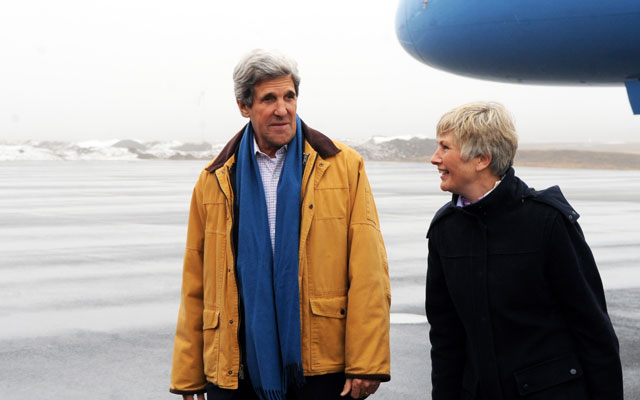State Department/Sipa USA/Newscom
Earlier this week the Arctic Council met in Sweden for its biannual meeting. At this time, the applications of 14 countries and organizations, including the European Union Commission, were considered by the Arctic Council to become observers. In what can only be described as a boost for sovereignty and democracy in the Arctic, the EU’s application was rejected.
The Arctic Council is the world’s primary multilateral forum regarding the Arctic region and focuses on all Arctic policy issues other than defense and security. It was established in 1996 as a way for the eight Arctic countries to coordinate and work together on mutually important issues in the region.
Reflecting the fact that there are many countries, organizations, and indigenous groups that have legitimate interests in the Arctic region, the Arctic Council has an observer category of membership. Observers in the Arctic Council are allowed to attend all meetings, make oral statements, present written statements, submit relevant documents, and provide views on the issues under discussion However, they are not allowed to vote. This category is open to non-Arctic states, intergovernmental and inter-parliamentary organizations, and global and regional nongovernmental organizations.
The EU Commission is considered to be the executive branch of the EU and is perhaps the most undemocratic decision-making body inside the EU. More importantly, the EU Commission is a supranational organization, meaning that in some areas its authority and policymaking transcends the national governments of the 27 EU member states.
As a supranational organization, the EU Commission does not meet the criteria to join the Arctic Council as an observer. Nowhere in the criteria for observer status issued by the Arctic Council does it state that supranational organizations can be observers.
There is no need for the supranational EU Commission to have a formal role in the Arctic Council. There are three permanent members and seven observers in the Arctic Council that are also in the EU and can ensure that European interests are represented.
As part of the process of constantly expanding its policy remit, the EU Commission has long sought a bigger role in Arctic issues. Supporting the EU Commission’s application for observer status is not in the interest of the U.S.—nor of the other members of the council—as it erodes the importance of state sovereignty in the Arctic.
The U.S. should ensure that undemocratic, unelected, unaccountable, and supranational organizations such as the EU Commission do not receive an undeserved voice on Arctic issues. Any legitimate concerns the EU may have on Arctic issues can be addressed by the European countries already in the Arctic Council.
America must support its Canadian ally and should continue to oppose the EU Commission’s application for observer status in the Arctic Council.
Source material can be found at this site.










